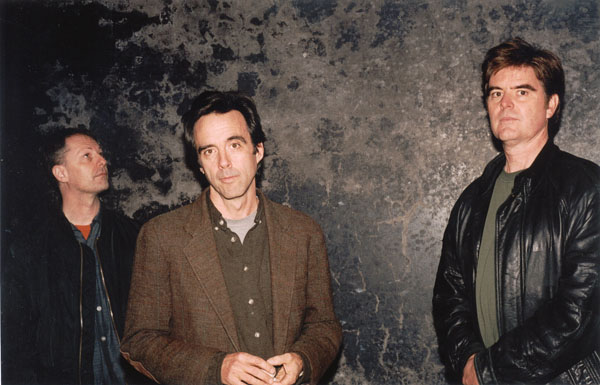Alumni Gazette
 Double Major: “I majored in English and minored in House of Guitars,” says Conley (center), referring to the Rochester specialty guitar shop. (Photo: Diane Bergamasco)
Double Major: “I majored in English and minored in House of Guitars,” says Conley (center), referring to the Rochester specialty guitar shop. (Photo: Diane Bergamasco)Be it resolved: Whereas some bands make the charts, Mission of Burma makes waves.
At Rochester, Clint Conley ’77 could be seen often on River Campus, playing at dances in the funk bands Mocha Shake and the Broad Street Stroke. But after graduating with his degree in English, the self-described “music wonk” moved to Boston to try his hand at his greater musical love: punk rock.
“As a career move, it was ridiculous to graduate from college and want to join a band and make this kind of music that the world made plain it had no use for,” says Conley. But three decades later, people are still talking about the music Conley made—and still makes—with the band Mission of Burma.
The band’s career began in sweat-filled basement clubs in Boston, and culminated three decades later with the Boston City Council’s formal declaration of October 4, 2009, as “Mission of Burma Day”: a day to recognize the band that has inspired the likes of R.E.M., Nirvana, U2, and the Pixies, and has helped bring renown to Boston’s music scene.
“We’re referred to as post-punk in that we came in the years after that initial noisy beginning, after the Ramones and the Sex Pistols,” says Conley, referring to two pathbreaking punk groups of the mid-1970s.
But he finds the label awkward. And so too do some of the band’s admirers, such as John Covach, a professor of music with a joint appointment at the Eastman School and the College of Arts and Sciences.
“Mission of Burma is a lot more like the Velvet Underground or early Pink Floyd than like the Sex Pistols or the Ramones,” says Covach, who is also a classically trained rock guitarist and author of What’s that Sound?: An Introduction to Rock and its History (W. W. Norton). “The music has plenty of raw punk power, but there’s also a level of sophistication to the tracks that makes them an interesting blend of punk and avant-garde music. It’s like they set out to employ the simplest possible musical textures but in the most unconventional manner possible.”
Michael Azerrad, a bestselling author and rock journalist who included a chapter on Mission of Burma in his 2001 book, Our Band Could Be Your Life: Scenes from the American Indie Underground, 1981–1991 (Little Brown & Co.), strikes a similar chord. “Their volume and speed connected them to some bands, their occasional pop hooks tied them to others,” he wrote. “But no one else combined the two.”
The group recorded and played live from 1979 to 1983, then disbanded, until 2001 when, for reasons neither Conley nor his bandmates can pinpoint, three of the four of them reunited. Since then, they’ve produced three studio “albums” (“I still call them albums,” admits Conley), including most recently, The Sound, The Speed, The Light (Matador Records, 2009).
But there’s no question the band’s reputation is firmly rooted in their initial years.
“It was just a tremendously exciting time in rock music,” Conley says of the late 1970s and early 1980s. “Most of the world didn’t know it, because it was a very, very small scene at that time. But there were so many new ideas flying around.”
The band attracted a strong fan base in Boston, with clusters of followers in Washington, D.C., and on the West Coast. But in those days, before home computers were widespread (to say nothing of the Internet and digital music) the numbers were never large.
Conley doesn’t regret that he didn’t have access to those tools. Describing the life of an underground music connoisseur in those days, he says: “You’d hear about something that was cool out in Cleveland, and you’d write a letter, and you’d wait a month, and maybe you’d get the 45, or maybe you wouldn’t. And it sounds so old-fashioned, so clunky, and so Pony Express. But there’s this undeniable romance about the drive it took and the personal investment one had to make to find this rare, obscure music, and it was really like finding little gold nuggets in the stream.”
Today Conley is an Emmy Award–winning field producer for the magazine show, Chronicle, at Boston’s ABC-affiliated station, WCVB-TV.
And he lives in the Boston suburb of Concord, along with his wife, Deborah, and their daughter, Caroline, 14. Their older daughter, Brinna, 18, is a freshman at Greensboro College in North Carolina.
While the group has been prolific, it’s not a full-time job, says Conley. “We go out once every couple of months, on average. We’re weekend, for the most part.” The band will perform in Europe twice this spring.
The crowds are a mixture of young and old. That said, Conley notes that at a festival in Kentucky last fall, “We crossed a benchmark: our first fan with a walker, with a gray ponytail. He was rocking away, and we thought, ‘well, it had to happen some day.’ But what a wonderful thing.”
For now, Burma plans to stay the course. But, Conley adds, “I hope we stop before the snickering starts in the wings.”

